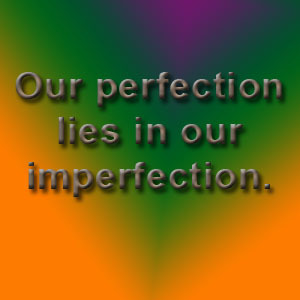I’m not OK, you’re not OK; but that’s OK!
 I’m not OK, you’re not OK; but that’s OK!
I’m not OK, you’re not OK; but that’s OK!
I love that line: I’m not OK, you’re not OK; but that’s OK! It captures the truth about who we are and the fact that we were never meant to be perfect. If we were, there would be no one to create opportunities for us to experience forgiveness. Our perfection lies in our imperfection.
I also love the following definition of Radical Forgiveness, which is along the same lines: It is the unconditional acceptance of what is, as is, because that’s how it is meant to be.
Putting the two together then, we can say Radical Self-Forgiveness is accepting the consequences of being ourselves, just as we are. Period.
It is so simple, but our own self-hatred is so deep, it is very hard to rise above it and touch the essence of who we are, which is Love. (The definition of Love is the same as Radical Forgiveness: Unconditional acceptance of what is, as is. Think about it!)
We’ve already covered a lot of what causes this: mainly parents and adults who shamed us into believing that we are no good. And so our core toxic beliefs about ourselves took root. Religious dogma that insisted we were sinners with no inherent divinity contributed its share. These and other influences gave permission to our inner judge and inner critic to make us wrong at every opportunity.
The book, A Course in Miracles , takes this much further by saying all our self-hatred comes from our overwhelming guilt over having defied God by choosing to separate from Him. i.e. the original sin. We are terrified that God will punish us so we project our guilt onto everyone else hoping to avoid the punishment.
, takes this much further by saying all our self-hatred comes from our overwhelming guilt over having defied God by choosing to separate from Him. i.e. the original sin. We are terrified that God will punish us so we project our guilt onto everyone else hoping to avoid the punishment.
I don’t buy that for one minute. My assumption is that we are here with God’s blessing, facilitating his/her/its expansion of consciousness. Hence the term Expanding into Love – expanding into God consciousness.
The difficulty with resolving our unconscious self-hatred caused by core-negative beliefs anchored in our subconscious minds is that they are mostly unconscious. Nevertheless, they are acting like little internal gyroscopes determining our lives and causing us a lot of distress.
So the first step is to find out what these core-negative beliefs are. The way to do this is to look at what keeps showing up in your life, and then you can deduce what the belief must be that creates those circumstances. Your beliefs create your reality out there in the world.
People also energetically pick up on your beliefs about yourself and subconsciously treat you according to how you are projecting the energy around the belief. So if you believe you are not worthy, people will pick up on that and make sure you don’t get what you desire.
The trick is to recognize that this person is subconsciously providing you with an opportunity to heal the misperception that you are unworthy. So you do a Radical Forgiveness worksheet on that person and that takes care of it. You might also do a Radical Self-Forgiveness/Self-Acceptance worksheet on yourself for holding that false belief.
Once you have completed your list of “likely” beliefs, look through to see which have the most resonance. The next step is to love those beliefs into healing. . . yes, love them as part of who you have been up until now, and remain open to the possibility they have served you. Love them for what they have done for you, even if you can’t see it.
Blessings,
Colin
P.S. The worksheets mentioned in this blog are available in PDF form when you sign up for Free Stuff at Colin’s Cafe.
P.P.S. Looking to work on your relationships, past, present and future? Try our new Expanding in Love Online Workshop, and choose a free bonus gift for a limited time.
Colin C. Tipping's Blog
- Colin C. Tipping's profile
- 43 followers



